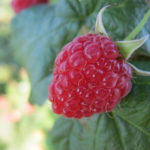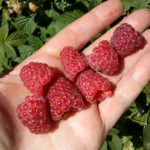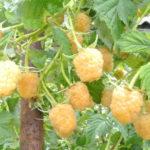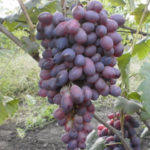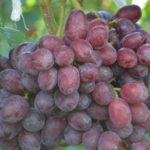Potato variety Blue Danube
Blue Danube is a medium-early table potato variety (Solanum tuberosum) of English selection. Bred in the UK by the specialists of The Sarvari Research Trust on the basis of the highly disease-resistant Sarpo Mira variety. In its homeland, it bears the official name Blue Danube. Plastic, able to adapt to any soil and climate. Differs in resistance to drought, mechanical damage, as well as most potato diseases. A special feature is the purple color of the tuber rind, while the flesh is white.
The period from full germination to harvest takes 65-80 days.
Plant of medium height, abundantly leafy. Stems are strong, erect. The leaves are dark green. The flowers are purple in color with a yellow corolla.
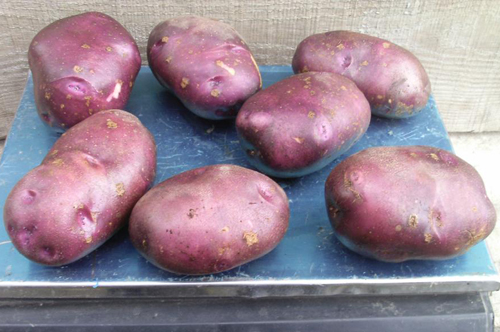
In one nest, 8-12 uniform tubers are formed with an average weight of 100-200 grams each, some specimens can reach a weight of more than 250 grams. Tubers have an oval elongated shape, slightly flattened. The peel is very strong, perfectly protects the potatoes from mechanical damage, has a blue-violet color, and is smooth to the touch. The pulp is white. The eyes are medium-sized, lie at an average depth.
The yield of the Blue Danube is very impressive - 350-400 c / ha. From one plant it is possible to get an average of about 2-3 kg of tubers. They are distinguished by a good marketable appearance, while there are practically no trifles in the nest - the yield of marketable tubers is 84-96%. Their keeping quality is excellent - 95%. They are also suitable for mechanical cleaning and long distance transport.
The taste is very good. The tubers are poorly boiled, so they are more suitable for frying, stuffing, making salads and vegetable mixtures, dressing soups. The flesh of potatoes does not darken during heat treatment, and the peel also does not change its purple color. In the finished form, the pulp is quite crumbly, the starch content in it is 13-16%.
The Blue Danube is not picky about soil and climate, it can adapt to any growing conditions. As for leaving, in this regard, our hero can be called ideal! It does not require much attention to itself, and most importantly, it is suitable for organic farming. That is, you can grow this variety without the use of chemical means of protection against diseases and pests. Another feature is that the yield remains high even without the introduction of mineral and nitrogen fertilizers into the soil. But the list of pluses doesn't end there. The plants are very powerful, and the weeds under them simply cannot grow, and therefore, the weeding process is greatly facilitated. At the beginning of the growing season, of course, it is necessary to regularly monitor the plantings and get rid of weeds in time. The variety is resistant to short-term drought, but the plants still need to be watered as needed. In regions with hot summers, two or three times the soil moisture will be sufficient.
Potato tubers have a fairly pronounced dormant period, so it is strongly recommended to germinate them before planting. By the way, this feature also plays another important role - tubers are perfectly stored throughout the year, without sprouting.
Blue Danube is resistant to common scab, golden cyst nematode, cancer, dry rot, Y virus, black leg virus, leaf roll virus, powdery scab, rhizoctonia, anthracnose, as well as late blight. This very impressive list of invulnerability brought our hero quite wide popularity among gardeners.
The variety in the past few years has ceased to be perceived as a curiosity, which they try to grow only for the sake of a one-time experiment or just for fun.It has proven itself to be a high-yielding, unpretentious, tasty and, most importantly, disease-resistant potato. He has a lot of advantages, but no shortcomings have yet been found. Is that when harvesting, finding tubers in the ground is a little more difficult, due to their blue-purple color. But despite the unusual color of the peel, a lot of gardeners paid attention to our hero and did not lose by choosing him for growing on their site.

